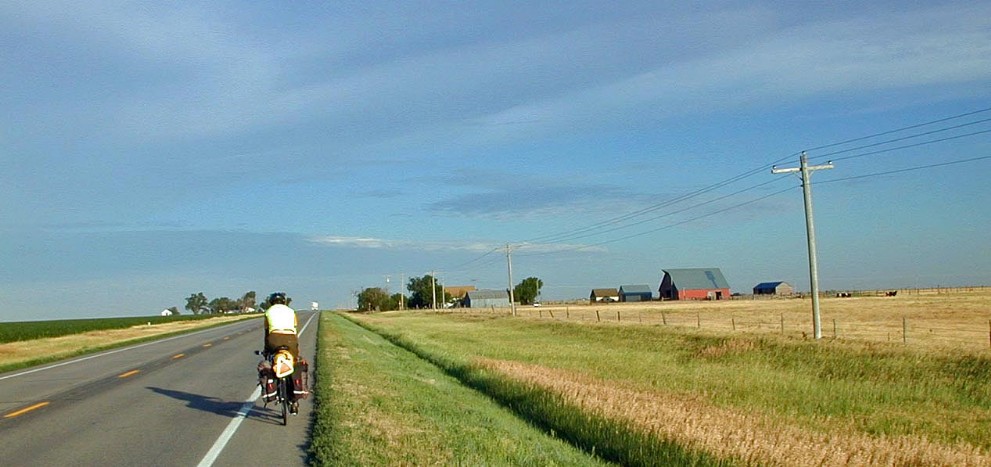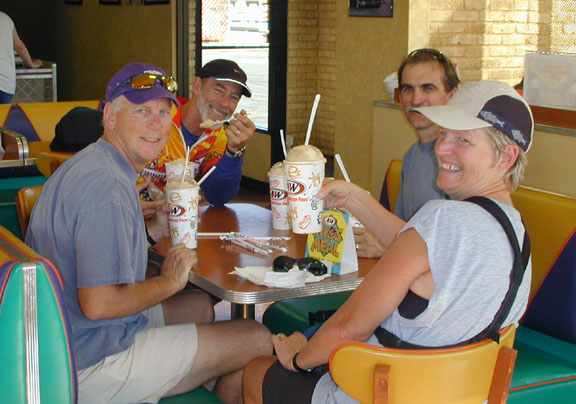November 9, 2001 - Mike and Marilyn's 2001 TranAmerican Bike Tour

Mike and Marilyn's
2001 TransAm Bike Trip
Main menu:
November 9, 2001
TRANSAM 2001 > Washington
EpilogueNovember 9, 2001. Wenatchee, WashingtonIt is now 3 months since the end of our trip and we are finally getting back to our familiar routine, though we still think about our bike trip every day. For the first month after our return, both of us dreamt every night that we were still on the road, pedaling with determination to our next destination. It is a wonder we did not churn up the bed covers with all of our pedaling. More recently I dreamt about the Cookie Lady and her humble generosity.I also find that whenever we drive somewhere I still imagine myself outside the car, traveling the route by bicycle too. I mentally experience the trip along the shoulder of the road, back in the open air again, trying to take in all of the senses.Peter and Maren, our TransAm cycling companions June 10-15 , visited us at our home here in Washington soon after our return. Since their trip had been cut short in Colorado, they were traveling through the western U.S. by rental car, carefully avoiding the TransAm bike route in order not to spoil their plan to finish the route in 2002. It was the bicycle trip, not the car trip, that they talked about with the most enthusiasm. We hope to bicycle with them again.We have also heard by email from many of the other cyclists we met along the way. Holger Anderson, whose trip included crossing Nevada’s Loneliest Highway in the heat of the summer, put his foot in the Pacific and cried out to the entire world, "I DID IT!" Lorraine Gebert, who teamed up on a tandem with her son Steve, was overcome with both sadness that the trip was over and happiness to have made it coast to coast at age 67.A month after our return, we had another chance to relive the experience when we joined two other couples who had also ridden across the U.S. (Northern Tier in 2000). We spent a fun weekend with them sharing stories during an organized, 160 mile bike ride in Northern Idaho. By the end of the weekend, a familiar craving overcame all of us, and we could not head for home until we had located and consumed large root beer floats.A weekend of riding elicits a Pavlovian response among coast-to- coast bicycle veterans. Here are a few more impressions from our trip:
- The vast majority of Americans are a kind, generous, and friendly people, like people all over the world. People approach you and engage more easily in conversation when you are on a bicycle.
- So many small towns across America’s heartland are struggling and dying. Growth of the larger cities is predominantly different arrangements of the same chain stores and fast food restaurants, difficult to tell one from another. Our country is losing some diversity in this trend.
- America’s dependence on gasoline is sobering if one contemplates the possibility of a severe gasoline shortage. This is a big country with vast distances, yet no strong mass transit infrastructure. The population finds driving too easy and inexpensive, even in areas of severe economic depression. Driving a private vehicle is our primary mode of transportation (and recreation), even if it is from one end of a campground to the other. I wondered if some of the same people we talked to who expressed pride in Abraham Lincoln’s humble Kentucky origins, would have walked 100 yards to borrow a book, much less as many miles as Abe did.
- Too frequently we encountered a disconcerting "Can’t do" attitude regarding their own physical ability when people learned what we were doing. Even able-
bodied teenagers who were intrigued with the idea of bicycling across the country made statements like, "I could never do that", "I can’t even walk a mile", "I couldn't ride a bike across town," as if an accomplishment like this was somehow completely out of their realm of possibility. Mike was once a teenager who thought like this. So who needs legs anyway? Others often expressed that they would be too fearful to be as openly exposed to the weather, the terrain, and other people as we were on bicycles, yet it was traffic that posed our biggest threat, as it does for the motorist, and possibly in indirect ways, for our whole country.
- All across small town America we encountered the phenomenon of "men in groups", local farmers, ranchers, cowboys, businessmen, hanging out together over coffee and cigarettes. We were always stumbling into one of their informal gathering places, usually a cafe, minimart, or campground lounge. Only the accents and subjects changed from region to region. In the east, it was about tobacco, coal, weather, politics... in the Midwest, it was about hogs, tornadoes, weather, politics... out West it was about horses, hay, weather, politics.... The looks they gave us were all the same.
- Experiencing the physical reality of the country, the topography, the weather, and the ecosystem gives history a depth that you cannot obtain from books and interpretive centers. Though we had read extensively about Jefferson, the Oregon Trail, and the Lewis and Clark Expedition, visiting Monticello, and following the historic routes across the country by bicycle gave us a deeper understanding.
Riding a bicycle across America is an empowering and enlightening experience. We learned that our dream was possible with enough determination, that a big journey is a sum of small steps, that it is possible to take time off from jobs and responsibilities without the world collapsing, that we could roll with the unexpected, handle adverse conditions, find the physical strength to go the distance, and still have fun along the way. I guess it is not unlike the rest of life.




